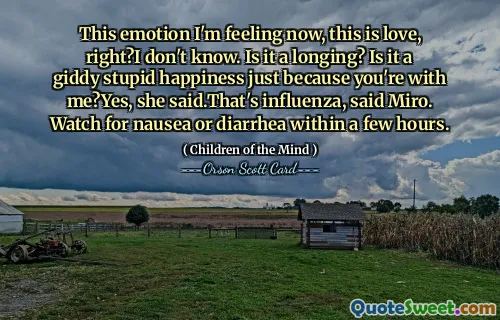
Perhaps that's the whole point about infidelity, I suggested, not that one has sex but that by doing so one puts at risk someone else's happiness?
This quote delves into the profound emotional and moral dilemma surrounding infidelity. It moves beyond the superficial act of physical intimacy to highlight the more nuanced and consequential aspect: the impact on others' wellbeing. When someone engages in infidelity, it isn't merely a breach of a personal agreement; it often reflects deeper issues of trust, insecurity, or dissatisfaction within a relationship. The act's real significance, as suggested here, lies in the potential harm it causes to the emotional stability and happiness of a partner, and perhaps others involved. Recognizing infidelity's true gravity involves understanding its ripple effect—vulnerable hearts, shattered trust, and the distress caused by betrayal. It forces us to consider whether the act is driven by personal needs or by a broader recklessness that disregards the emotional investment of others. This perspective emphasizes empathy and accountability, reminding us that actions resonate beyond the individual, affecting a web of relationships. Such insight invites deeper reflection on fidelity, respect, and the moral responsibility we hold towards those whom our actions may inadvertently hurt. It also challenges the reader to think about the motivations behind betrayal and whether the pursuit of personal gratification can ever be justified at the expense of someone else's happiness. Ultimately, this understanding urges honesty and commitment as foundations for genuine, respectful relationships, recognizing that true intimacy involves safeguarding mutual well-being rather than risking it for fleeting satisfaction.











